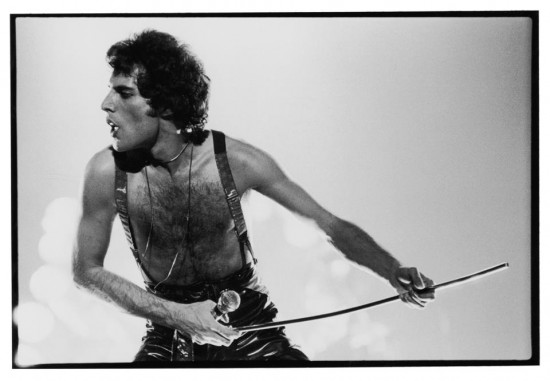Goodbye, Freddie Mercury (and Why Queen and the Popluar Music of the 70’s was Better)
Nov 25th, 2012

A friend posted something on Facebook about Freddie Mercury’s death (21 years ago yesterday) and it got me thinking about him, for a quick minute or so, like so many of the lightning-fast blips that we’re fully accustomed to coming in brief contact with on social media, online, on television, in the street, in daily life, etc.
Ironically, or maybe not at all, it was the striking black and white photo (posted here) that caught my attention. (Ironic since, obviously, it was the phenomenon of this man’s extreme musical/audial magic-making that made me, along with large portions of humanity, become so fully enraptured, and maybe not at all since his mastery at showmanship and visual presentation, were and are blatantly obvious and acknowledged by anyone who cared or cares to look.)
And so I shared it on Facebook, and posted on Twitter. But it made me feel sad, and maybe even a bit shameful, as it often does, to have so quickly and summarily passed over a presence that has meant a very lot to me over the years. So I thought I’d like to just write a little something more, to commemorate in my own way.
But what can one possibly say about such an icon that hasn’t been said elsewhere? Not much probably, so here are just a few of my own personal musings on and connections to the man, the band, and their music.
The Compositions – People sometimes ask me what it is exactly that I love so much about the music of the 70’s, why I seem to revere the music of that decade above all others, and I love talking, basically to anyone who will listen, about my thoughts and theories about it, specifically the idea that the 1970’s were pretty much the last time, at least from a songwriting perspective, that a majority of the mainstream popular music artists were, generally speaking, true, wholly unique artists and WRITERS, and how this was such a massive hallmark and cultural difference between the popular music of the 70’s versus since then. There was and is absolutely no one else on the planet who could write a Joni Mitchell song. The same goes for Neil Young, Elton John, Steely Dan, Fleetwood Mac, Led Zeppelin, Billy Joel, and on and on and on. And Queen is a primary example of this.
(I very much don’t wish it to be misunderstood that I think there are any fewer wholly original artists making and writing music today at all. There certainly are those artists living and working, and will be as long as humanity exists in roughly the same form we do now, but only that it seems to me that in general these artists don’t tend to be played all that much on radio, or if they are they’re in the minority, not nearly as visible as those that have what I would consider significantly more ‘commercial’ (i.e. commerce-driven) than artistic (i.e. spirit-emotion-humanity enriching) motivations behind them, their songwriting, producing, marketing, etc.)
Which segues very nicely into the next section:
The Sound – nobody sounds like Queen. Nobody. Period. The combination of those absurdly unique-reminiscent-neo-classical-hard-rock-prog-rock-fifties-rock-glam-rock-etc. compositions with the sound of his voice, the harmonies (both vocal and instrumental), John Deacon’s astounding bass playing, the instantly recognizable production and arrangements, and Brian May’s utterly singular guitar tone (from his unique, hand made guitar, built with his father out of their household’s mantelpiece when he was 15 years old), produced something which was in every way greater than the sum of its absurdly high-quality parts.
The Emotion – to this day I think about all the times I went to bed in college, listening so intently over and over to Somebody to Love, and as blown away as I was every single time by those undeniable elements listed above, it was Mercury’s unbridled exclamation of the most basic and universal of human desires that routinely brought me to tears. And the sheer bravado and steel resolve of personal statement and purpose of We Are the Champions, We Will Rock You, Killer Queen, Another One Bites the Dust, I Want It All, One Vision, the humor, joy, and celebration of shared humanity of Crazy Little Thing Called Love and Fat Bottomed Girls, the heartbreak, loneliness and existential horror of Under Pressure and Bohemian Rhapsody.
Which is really the heart of it I think. You can have all of the gifts, skills, talents, accolades, and airplay in the world but unless it’s grounded by a brilliant expression of human emotion, and brilliant storytelling (i.e. the successful demonstration through examples of our deepest, universal human concerns) no one’s going to care about it for very long.
And the world still very much loves Queen and Freddie Mercury.


